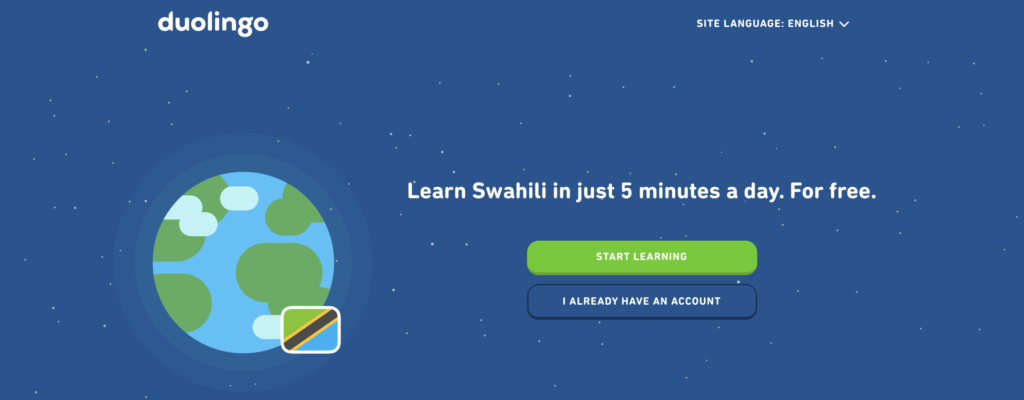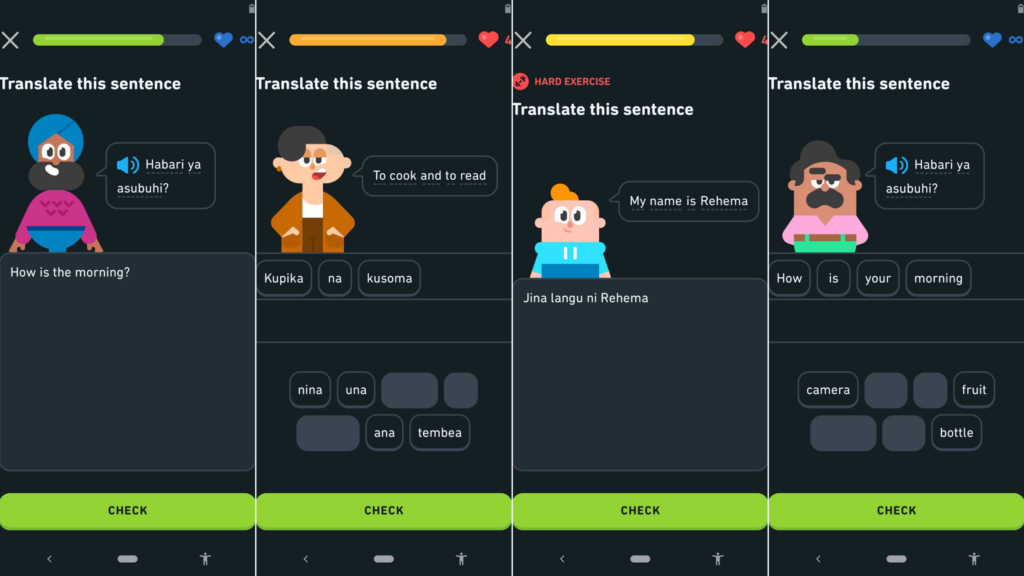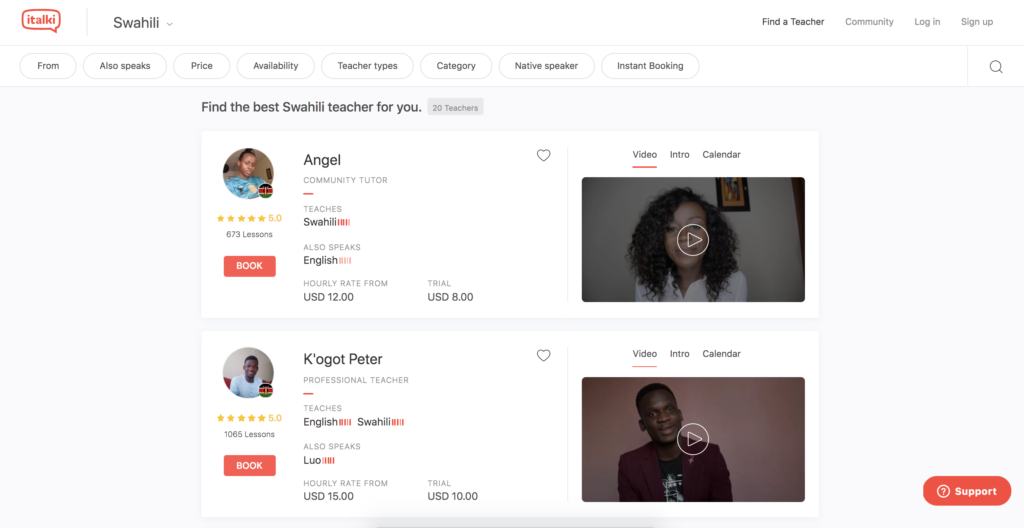Learning Swahili is fun, easy, and a great way to immerse yourself in Kenya and East Africa.
Swahili is the most widely spoken language in Africa, and you can use basic Swahili phrases from Uganda to Mozambique.
Take some to learn Swahili, and you’ll have a better appreciation for the region’s culture and history while also impressing your African friends and sharing their jokes.
I only started learning the language three years after I first visited Kenya and was shocked at how easy it is to pick up. In this guide, I’ll show you the resources I used to learn Swahili as a total beginner.
Duolingo

Duolingo is one of the most popular language-learning apps online and a great place to learn Swahili.
It’s free (but you can upgrade to a paid subscription) and available on desktop, iOS, and Android.
Whatever version you choose to learn from, Duolingo teaches you Swahili in bite-sized lessons, and it’s up to you how long you spend learning each day. I usually do 10-15 minutes each morning before work.

Duolingo is great for beginners, but you’ll never become conversational or fluent in Swahili learning from an app. Also, Duolingo teaches the Tanzanian dialect of Swahili, which is very different from the Swahili spoken in Kenya.
I suggest using Duolingo to get started and when you’re comfortable with basic phrases, move to live lessons with a teacher.
italki

italki connects language learners with over 10,000 teachers speaking hundreds of languages worldwide. You can sign up for 1-1 private tuition or join small group classes, using a teacher’s calendar to book a slot at any time that suits you.
There are 12 teachers from Kenya teaching Swahili, starting from US$6.00 per hour. Check out the reviews for each teacher and book a couple of trial lessons to see who’s the best fit for you.
Private lessons with a teacher are the best way to learn Swahili. You can tailor classes to your specific needs and learn how to have real conversations with human Swahili speakers – something Duolingo can never compete with.
4 Reasons to Learn Swahili
It’s The Most Widely Spoken Language in Africa
Over 90 million people speak Swahili across Africa.
While it’s most common in Kenya and Tanzania, you’ll meet plenty of Swahili speakers in Rwanda, Congo, Mozambique, and elsewhere.
Greater Appreciation for East African Cultures and Music
Swahili is the gateway to fully immersing yourself in the music and rich cultures of East Africa.
While English is great for practical purposes, you’ll miss out on so many jokes, cultural touchstones, memes, music, and more if you don’t pick up little Swahili.
Outside the cities, in rural areas, Swahili is spoken much more widely than English. So if you speak the language your experiences traveling in East Africa will be enriched exponentially.
Kenyan’s Will Appreciate the Effort
Most people who move to Kenya never make the effort to learn more than a few words in Swahili – never mind the European settlers who have lived here for generations and still can’t string a sentence together.
Yes, you can easily get by with English.
But if you choose to learn Swahili, people will notice and appreciate the effort – even if you suck at the start. You’ll stand out from the 1,000s of people who work in Kenya and never make the effort to assimilate. It also makes some interactions on the street much easier, as you can fill in the gaps of someone’s broken English with your broken Swahili.
Finally, you’ll learn all the Kenyan slang rarely shared with mzungus and other foreigners. It’s worth learning Swahili for that alone!
It’s Not Too Difficult
On the grand scale of global languages, Swahili is considered one of the easier to learn. It’s usually ranked 2 or 3 out of 5 for difficulty.
There are several reasons for this:
1. Swahili pronunciation is simple.
Swahili only has five basic vowel sounds, similar to those in Italian and Spanish. Most Swahili consonant sounds can be found in English as well.
Swahili is also written phonetically, so it sounds like it looks on paper. And unlike many Asian languages, there are no tones or other quirks you need to master to learn Swahili.
2. Swahili is gender-neutral.
Gendered nouns and pronouns are among the most challenging things about learning many languages – but not Swahili!
Swahili is completely gender-neutral, with no masculine or feminine version of nouns. You can say the same thing for ‘he’ or ‘she’ in any situation. For example, “Yeye ni mKenya” translates as both She is Kenyan and He is Kenyan.
In fact, Swahili is a very informal language, without too many crazy rules to remember. Once you learn the basics, you can already start mastering the language.
3. Asking questions is easy.
Questions are another excellent example of how simple it is to learn Swahili. There are no additional words in Swahili to turn a statement into a question.
Instead, you simply add an upwards inflection at the end of the sentence to show it’s a question. You probably already do this when asking questions in English anyway.
For more formal settings, just a ‘Je’ at the start of a sentence to make it a question. For example: “Unajua Kiingereza (You speak English.)” becomes “Je, unajua Kiingereza (Do you speak English?)”
4. You already know some Swahili phrases.
If you grew up in the 90s watching Disney movies, there’s one Swahili you already know. It means no worries, for the rest of your daaaaays!
Yes, hakuna matata is a legitimate Swahili phrase, and you’ll hear it everywhere you go. Mostly because Kenyans love shouting it at tourists. And yes, hakuna matata translates to ‘no worries’’.
Aside from hakuna matata, you might also know:
- Safari – journey
- Simba – lion
- Rafiki – friend
- Jenga – verb. to build
- Asante sana – ‘thank you’ as sung by Rafiki in The Lion King.
And once you arrive in Kenya, you’ll quickly pick up many more basic phrases.
Even better, Kenyans usually intersperse their English with Swahili phrases when with friends or family – and vice versa. This may seem confusing, but it actually helps you learn Swahili.
You’ll start to identify the phrases you’re learning within English sentence structure, making them stickier and more contextual. You can also just drop Swahili words into your English if you don’t know the whole sentence but still want to practice isolated phrases.
Over time, you’ll start stringing those phrases together into complete sentences.
Simple Swahili Phrases
| Hello | Mambo (also means ‘What’s up?’) |
| How are you? | Habari |
| Good | Nzuri |
| Cool! | Poa! (Can be a response to ‘Mambo) |
| Okay | Sawa |
| Thank you | Asante |
| Welcome/You’re welcome | Karibu |
| Please | Tafadhali |
| Goodbye | Kwa heri |
| Yes | Ndiyo |
| No | Hapana |
| Sorry (to express sympathy) | Pole |
| Confused white person | Mzungu! |
| Water | Maji |
| Tea | Chai |
Final Thoughts
Have you decided to learn Swahili?
These online resources will help you take the first steps by teaching you the basics.
With practice, you can develop your Swahili and become a fluent speaker in no time!

Leave a Reply